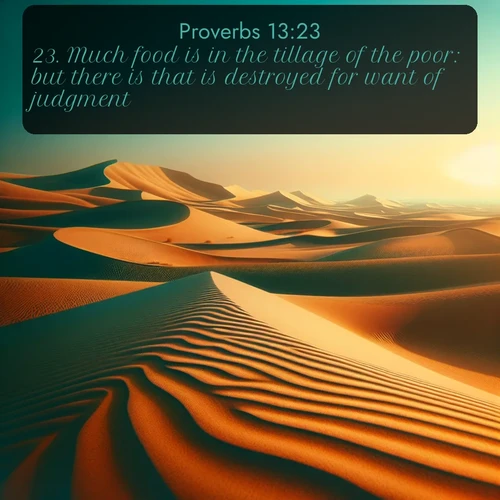Proverbs 13:23 plusieurs versions / traductions
English Bible Translations
23. Much food is in the tillage of the poor: but there is that is destroyed for want of judgment.
23. Much food [is in] the tillage of the poor; But there is that is destroyed by reason of injustice.
23. There is much food in the ploughed land of the poor; but it is taken away by wrongdoing.
23. Much food is in the tillage of the poor; but there is that is lost for want of judgment.
23. Much food is in the tillage of the poor: but there is that is destroyed for want of judgment.
23. Abundance of food -- the tillage of the poor, And substance is consumed without judgment.
German Bible Translations
23. Es ist viel Speise in den Furchen der Armen; aber die Unrecht tun, verderben.
23. Oft wäre viel Speise in den Furchen der Armen; aber man nimmt sie ihnen weg gegen alles Recht!
French Bible Translations
23. Le champ que défriche le pauvre donne une nourriture abondante, mais l'absence d'équité provoque la perte de certains.
23. Le champ que défriche le pauvre donne une nourriture abondante,Mais tel périt par défaut de justice.
23. Le champ que défriche le pauvre donne une nourriture abondante, Mais tel périt par défaut de justice.
23. Il y a beaucoup à manger dans le défrichement des pauvres, mais il y a ce qui se perd faute de règle.
23. Il y a beaucoup à manger dans les terres défrichées des pauvres; mais il y a tel qui est consumé par faute de règle.
23. Il y a beaucoup à manger dans le champ défriché par le pauvre; mais il y a des hommes qui périssent faute de jugement.
Versions with Strong Codes
Proverbs 13 / KJV_Strong23.
Strong Code definitions
H7230 rob robe from H7231; abundance (in any respect):--abundance(- antly), all, X common (sort), excellent, great(-ly, -ness, number), huge, be increased, long, many, more in number, most, much, multitude, plenty(-ifully), X very (age).see H7231
H400 'okel o'-kel from H398; food:--eating, food, meal(-time), meat, prey, victuals.see H398
H5215 niyr neer or nir {neer}; from H5214; properly, plowing, i.e. (concretely) freshly plowed land:--fallow ground, plowing, tillage.see H5214
H7326 ruwsh roosh a primitive root; to be destitute:--lack, needy, (make self) poor (man).
H3426 yesh yaysh perhaps from an unused root meaning to stand out, or exist; entity; used adverbially or as a copula for the substantive verb (1961); there is or are (or any other form of the verb to be, as may suit the connection):--(there) are, (he, it, shall, there, there may, there shall, there should) be, thou do, had, hast, (which) hath, (I, shalt, that) have, (he, it, there) is, substance, it (there) was, (there) were, ye will, thou wilt, wouldest.see H1961
H5595 caphah saw-faw' a primitive root; properly, to scrape (literally, to shave; but usually figuratively) together (i.e. to accumulate or increase) or away (i.e. to scatter, remove, or ruin;intransitively, to perish):--add, augment, consume, destroy, heap, join, perish, put.
H3808 lo' lo or lowi {lo}; or loh (Deut. 3:11) {lo}; a primitive particle; not (the simple or abs. negation); by implication, no; often used with other particles (as follows):--X before, + or else, ere, + except, ig(-norant), much, less, nay, neither, never, no((-ne), -r, (-thing)), (X as though...,(can-), for) not (out of), of nought, otherwise, out of, + surely, + as truly as, + of a truth, + verily, for want, + whether, without.
H4941 mishpat mish-pawt' from H8199; properly, a verdict (favorable or unfavorable) pronounced judicially, especially a sentence or formal decree (human or (participant's) divine law, individual or collective), including the act, the place, the suit, thecrime, and the penalty; abstractly, justice, including a participant's right or privilege (statutory or customary), or even a style:--+ adversary, ceremony, charge, X crime, custom, desert, determination, discretion, disposing, due, fashion, form, to be judged, judgment, just(-ice, -ly), (manner of) law(-ful), manner, measure, (due) order, ordinance, right, sentence, usest, X worthy, + wrong.see H8199
Prédications qui analysent les thèmes Proverbes 13
Thèmes : Sagesse et folie; Discours sur l'argent; Relations interpersonnelles; Discipline et enseignementRelated Sermons discussing Proverbs 13
Themes : Sagesse et folie; Discours sur l'argent; Relations interpersonnelles; Discipline et enseignementsee also: Bible Key Verses ; KJV Bible Images, BBE Bible images

